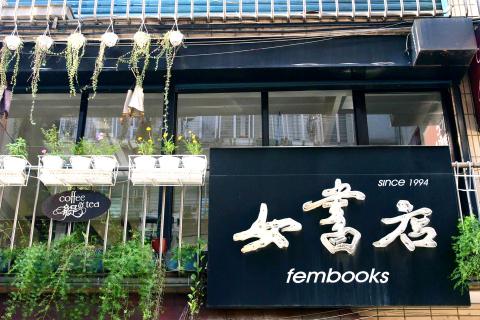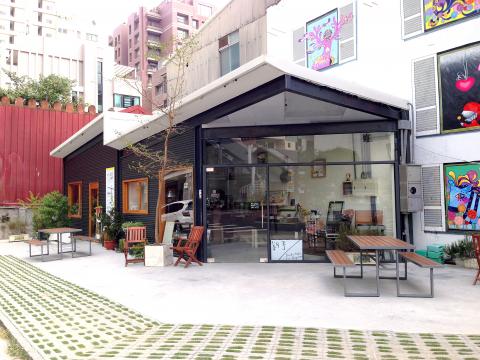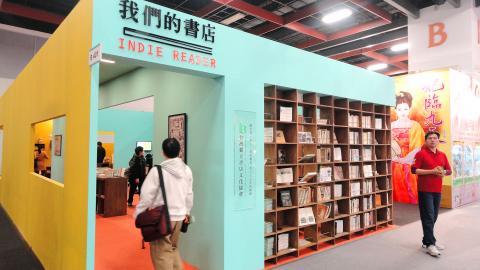Edward Su (蘇至弘) says business for independent bookstores has gone from bad to worse. Su, who operates NTHU Books (水木書苑) a bookstore at Hsinchu’s National Tsing Hua University (國立清華大學), has seen his profits disappear.
To make up for a slump in book sales, Su has expanded the range of products he sells to include university souvenirs and stationery, CDs and coffee. But business hasn’t improved.
“Last year, the bookstore was about NT$700,000 in the red,” Su said.

Photo courtesy of Fembooks
Times weren’t always so tough. Liao Ying-liang (廖英良), owner of Thus Books (東海書苑) in Greater Taichung, said most independent bookstores did good business during the 1980s and early 1990s.
“But things have changed since the turn of the century,” Liao said, citing the purchase of local online bookstore Books.com.tw (博客來) by President Chain Store Corporation (統一超商) in 2000, which allowed readers to order books online and pick them up at any 7-Eleven.
Su and Liao say the proliferation of Internet access and the consequential boom of book e-commerce are major factors driving the change in the book market.

Photo courtesy of Cheng Yu-ting
“My bookstore’s operating costs now rely on selling coffee … The revenue generated by books can’t even pay my electricity bills in the summer,” Liao says.
COMMUNITY CULTURE
In March last year, Liao, Su and several other indie bookshop owners initiated the Taiwan Association for Independent Bookshop Culture (TAIBC, 台灣獨立書店文化協會), joining forces not only for their own financial survival, but also to revive the “culture” of independent bookstores.

Photo by Tang Hsiang-yi, Taipei Times
Liao says there are 30 members, of which bookstore owner’s account for one third. “The rest are likeminded partners from all walks of life,” Liao said.
Liao says independent bookstores play an integral part in supporting social movements, alternative culture and community development and building a cultural scene that encourages civic participation on public issues.
“Many people get their ‘FXXk the Government’ stickers and anti-nuclear power flags from independent bookstores across the country,” Liao said, citing protests against demolitions in Dapu Village (大埔) in Miaoli County’s Jhunan Township (竹南), and rallies held to stop the building of the Fourth Nuclear Power Plant in New Taipei City.
The association has recently organized a series of talks on topics that consider the definition, social value, survival and future development of independent bookstores.
TAIBC set up a booth titled Indie Reader (我們的書店) at the Taipei International Book Exhibition (TIBE,台北國際書展). It displayed books on art, feminism, sociology, organic farming and picture books for kids from about 10 independent bookstores .
Unlike most TIBE exhibitors, Indie Reader didn’t rely on attracting customers with sales discounts, but instead encouraged readers to revisit the pleasure of spending time among bookshelves and the smell of coffee.
Liao says he used the book fair as an opportunity to communicate with general readers, who might only buy books on the bestseller’s list, to educate them of what other choices are available.
“Large book chains or online bookstores don’t promote books they think are hard to sell. Some books just disappear into a sea of books, which in turn narrows reader’s choices,” Liao said.
“Dorothy Behre, a visitor to the booth, bought Why Sell Books at All? (聽見書店的聲音), a book published by TAIBC that tells the stories of 28 independent bookstores, some of which are members of the organization.
Behre said she enjoys visiting independent bookstores in her US hometown and her current home in Greater Kaohsiung.
“I like the zines [small circulation of self-published work] and the cozy reading environment in indie bookstores,” she said.
SURVIVING IN A DIGITAL AGE
During one of the 12 talks held at Indie Reader during TIBE, Hsia Chu-joe (夏鑄九), professor emeritus at National Taiwan University’s Graduate Institute of Building and Planning, offered ideas on how independent bookstores can survive in the age of the Internet.
Hsia said he shares TAIBC’s motive to introduce the cultural significance of independent bookstores, and that by forming a group, indie booksellers can come up with a strategy to buy books together in larger quantities to reduce the cost.
“As a repeat user of indie bookstores, I see how interpersonal relationships grow between the owner and readers or among readers, which doesn’t happen in large book chains or in online bookstores” Hsia said.
Hsia advises indie booksellers to explore the “experience economy” and offer interactive events for its readers that leave a lasting impression. Hsia cites Tonshan Bookstore (唐山書店), which provided access to banned books during the 1980s an example.
“Even the act of buying books excited people,” he said.
Hsia added that although one can find pretty much any title online, “you can’t find the cultural ambience unique to each independent bookstore when you buy books online.”
Le Pigeonnier, an independent book store specializing in French titles, has established a client base with regular cultural activities, including author’s talks, handicraft workshops and book discussion clubs.
“At first, we used French food as a ruse to attract readers. Now they come just for the events. Free food isn’t the point anymore,” said senior bookstore staff Amelie Sun (孫美麗).
Sun says a solid client base hasn’t sustained the 15-year-old bookstore financially, as it ran at a loss for the first 10 years.
“We capitalized on our niche: importing books from France, to get contracts with university libraries, academic institutions and basically anyone who may need French books,” Sun said.
“Business didn’t improve overnight. It took time to earn other people’s trust and build a long term working relationship,” Sun added.

For many centuries from the medieval to the early modern era, the island port of Hirado on the northwestern tip of Kyushu in Japan was the epicenter of piracy in East Asia. From bases in Hirado the notorious wokou (倭寇) terrorized Korea and China. They raided coastal towns, carrying off people into slavery and looting everything from grain to porcelain to bells in Buddhist temples. Kyushu itself operated a thriving trade with China in sulfur, a necessary ingredient of the gunpowder that powered militaries from Europe to Japan. Over time Hirado developed into a full service stop for pirates. Booty could

Politically charged thriller One Battle After Another won six prizes, including best picture, at the British Academy Film Awards on Sunday, building momentum ahead of Hollywood’s Academy Awards next month. Blues-steeped vampire epic Sinners and gothic horror story Frankenstein won three awards each, while Shakespearean family tragedy Hamnet won two including best British film. One Battle After Another, Paul Thomas Anderson’s explosive film about a group of revolutionaries in chaotic conflict with the state, won awards for directing, adapted screenplay, cinematography and editing, as well as for Sean Penn’s supporting performance as an obsessed military officer. “This is very overwhelming and wonderful,” Anderson

Social media addiction has been compared to casinos, opioids and cigarettes. While there’s some debate among experts about the line between overuse and addiction, and whether social media can cause the latter, there is no doubt that many people feel like they can’t escape the pull of Instagram, TikTok, Snapchat and other platforms. The companies that designed your favorite apps have an incentive to keep you glued to them so they can serve up ads that make them billions of dollars in revenue. Resisting the pull of the endless scroll, the dopamine hits from short-form videos and the ego boost and validation

The Siberian crane (Leucogeranus leucogeranus) is an exceptionally attractive bird. Mature specimens have snowy white plumage and wingspans well over 200cm. This critically endangered species wasn’t recorded in Taiwan until December 2014, when a juvenile landed in New Taipei City’s Jinshan District (金山), having apparently gotten separated from its flock during a southward migration from the Russian Arctic to Poyang Lake (鄱陽湖) in China. During the crane’s 17-month sojourn, the area’s rice farmers curtailed their use of agrochemicals. A security detail paid for by the local government prevented dogs and photographers from getting too close to the bird. In November 2021, a